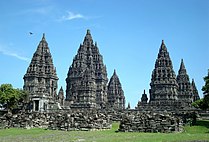
Back تاريخ الهندوسية Arabic Гісторыя індуізму Byelorussian হিন্দুধর্মের ইতিহাস Bengali/Bangla རྒྱ་གར་ཆོས་འབྱུང་ Tibetan Història de l'hinduisme Catalan Dějiny hinduismu Czech Hinduismens historie Danish Historia del hinduismo Spanish Hinduismoaren historia Basque تاریخ آیین هندوئیسم Persian
| Part of a series on |
| Hinduism |
|---|
 |
The history of Hinduism covers a wide variety of related religious traditions native to the Indian subcontinent.[1] It overlaps or coincides with the development of religion in the Indian subcontinent since the Iron Age, with some of its traditions tracing back to prehistoric religions such as those of the Bronze Age Indus Valley Civilisation. Hinduism has been called the "oldest religion" in the world,[note 1] but scholars regard Hinduism as a relatively recent synthesis[11][12][13] of various Indian cultures and traditions,[11][12][14] with diverse roots[15] and no single founder.[16][note 2] This Hindu synthesis emerged after the Vedic period, between c. 500[12]-200[22] BCE and c. 300 CE,[12] in or after the period of the Second Urbanisation, and during the early classical period of Hinduism (200 BCE – 300 CE).[12][22] It flourished in the medieval period, with the decline of Buddhism in India.[23]
The history of Hinduism is often divided into periods of development. The first period is the pre-Vedic period, which includes the Indus Valley Civilization and local pre-historic religions, ending at about 1750 BCE. This period was followed in northern India by the Vedic period, which saw the introduction of the historical Vedic religion with the Indo-Aryan migrations, starting somewhere between 1900 BCE and 1400 BCE.[24][note 3] The subsequent period, between 800 BCE and 200 BCE, is "a turning point between the Vedic religion and Hindu religions",[27] and a formative period for Hinduism, Jainism and Buddhism. During the Epic and Early Puranic period, from c. 200 BCE to 500 CE, the Epics and the first Purānas were composed.[12][22] It was followed by the classical "Golden Age" of Hinduism (c. 320–650 CE), which coincides with the Gupta Empire. In this period the six branches of Hindu philosophy evolved, namely, Samkhya, Yoga, Nyaya, Vaisheshika, Mīmāṃsā, and Vedānta. Monotheistic sects like Shaivism and Vaishnavism developed during this same period through the Bhakti movement. The period from roughly 650 to 1100 CE forms the late Classical period[28] or early Middle Ages, in which classical Puranic Hinduism is established,
Hinduism under both Hindu and Islamic rulers from c. 1200 to 1750 CE[29][30] saw the increasing prominence of the Bhakti movement, which remains influential today. Adi Shankara became glorified as the main proponent of Advaita Vedanta, in response to the succes of Vaishnavite bhakti.
The colonial period saw the emergence of various Hindu reform movements partly inspired by western movements, such as Unitarianism and Theosophy. The Partition of India in 1947 was along religious lines, with the Republic of India emerging with a Hindu majority. During the 20th century, due to the Indian diaspora, Hindu minorities have formed in all continents, with the largest communities in absolute numbers in the United States and the United Kingdom.
- ^ Brodd 2003.
- ^ Fowler 1997, p. 1.
- ^ Gellman & Hartman 2011.
- ^ Stevens 2001, p. 191.
- ^ Sarma 1987, p. [page needed].
- ^ Merriam-Webster (2000), Merriam-Webster's Collegiate Encyclopedia, Merriam-Webster, p. 751
- ^ Klostermaier 2007, p. 1.
- ^ Laderman 2003, p. 119.
- ^ Turner & 1996-B, p. 359.
- ^ Smart 1993, p. 1.
- ^ a b Lockard 2007, p. 50.
- ^ a b c d e f Hiltebeitel 2007, p. 12.
- ^ Samuel 2010, p. 193.
- ^ a b c d Flood 1996, p. 16.
- ^ a b Narayanan 2009, p. 11.
- ^ Osborne 2005, p. 9.
- ^ Samuel 2010, pp. 48–53.
- ^ Lockard 2007, p. 52.
- ^ Hiltebeitel 2007, p. 3.
- ^ Jones & Ryan 2006, p. xviii.
- ^ a b Gomez 2013, p. 42.
- ^ a b c Larson 2009.
- ^ Larson 1995, pp. 109–111.
- ^ Michaels 2004, pp. 32–36.
- ^ Witzel 1995, pp. 3–4.
- ^ Flood 1996, p. 21.
- ^ Michaels 2004, p. 38.
- ^ Michaels 2004.
- ^ Stein 2010, p. 107.
- ^ Tripathi, Ram Prasad (1956). Some Aspects of Muslim Administration. Central Book Depot. p. 24. Archived from the original on 14 November 2023. Retrieved 23 December 2023.
Cite error: There are <ref group=note> tags on this page, but the references will not show without a {{reflist|group=note}} template (see the help page).
© MMXXIII Rich X Search. We shall prevail. All rights reserved. Rich X Search




